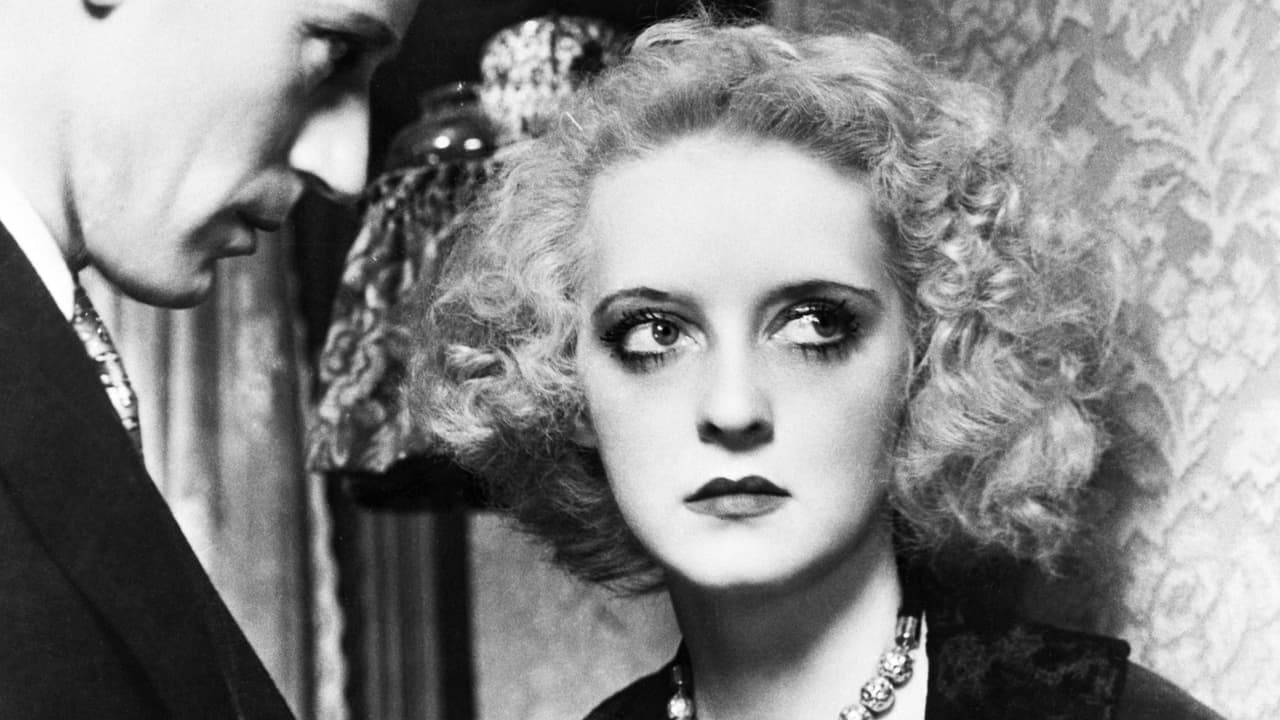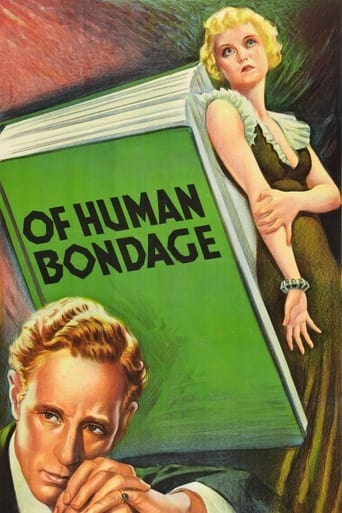

Self-important, over-dramatic, uninspired.
... View MoreReally Surprised!
... View MoreLet me be very fair here, this is not the best movie in my opinion. But, this movie is fun, it has purpose and is very enjoyable to watch.
... View MoreStrong acting helps the film overcome an uncertain premise and create characters that hold our attention absolutely.
... View MoreThis "review" is almost as much about the other comments as the movie itself. Had I read the book I reckon I would have rated the film lower. I believe many of the reviewers missed the significance of the term bondage, assigning it a sexual attraction, when it was a matter of being inexplicably smitten. The Mildred character, as portrayed by Davis, makes that hard to understand as does not touching on Philips upbringing.He was lucky to have had two other women attracted to him but due to the entrapment, the bondage, he is unable to reciprocate adequately. It is a disabilitating affliction. The story is intriguing on interweaving the off again on again abuse of the relationship and consequences to the characters. As noted by some other reviewers Philip has some dark sides of his own, allowing the viewer to distance themselves from being sympathetic and even chagrined at the unsatisfactory ending. Given the elegance of Somerset Maughn's short stories I suspect justice has not been done to the novel.
... View More** Contains Spoilers**If they just had a different title for this film, it might be more appreciated from younger audiences. It also could be titled, "Whatever Happened to Baby and Mildred". Besides the somewhat unbelievable plot of a pre-med student with means becoming obsessed with a floozy waitress, I was amazed at Phillips response to hearing that Mildred's baby had died, "I'm glad". That takes pro-choice to a new level. This would not get a great reception from today's PC world. Also, Mr. Miller (the baby's father) would have a few less schillings in his Lloyds of London bank account by today's standards. The movie does not explain why Mildred did not take legal action. Was Mr. Miller's cavalier attitude for ignoring his own child's welfare a sign of the times? Despite the story line not being very believable (pre-med student sacrificing career and principles for unattractive floozy), it is worth a viewing just to see these fabled actors in their early roles, especially the beautiful Frances Dee. Who in their right mind would choose Mildred over Sally?I would have liked the movie better if Phillip did not get out of the gutter. Why a happy ending for this undeserving loser?
... View MoreFearing that he will never be anything more than a mediocrity, young painter Philip Carey abandons his artistic ambitions in order to train as a doctor. The film, however, is less about Philip's medical career than about his love life and about the three women who feature in it- waitress Mildred Rogers, romantic novelist Norah and Sally Athelny, the daughter of one of his patients. Somerset Maugham's title does not refer to "bondage" in its literal sense of "slavery" or in the sense of a sado-masochistic sexual practice. Instead, he uses the word as a metaphor for those strong emotions, especially unrequited love, which bind one human to another. Norah is "bound" to Philip, whom she loves deeply, but he is equally "bound" to Mildred. He suggests that Mildred is in turn "bound" to another man, Emil Miller, but this is not entirely borne out by the script. Mildred is too self-centred to be in love with Miller or any other person."Of Human Bondage" is sometimes described as the film that made Bette Davis a star. She certainly wanted the role of Mildred desperately and fought hard to persuade Warner Brothers, to whom she was under contract, to lend her to RKO, who were making the film. Studio head Jack Warner was initially reluctant to do so because he feared that the role might harm Davis's glamorous image, but eventually relented after several other actresses, including Katharine Hepburn, had turned it down. Her performance was critically acclaimed and the Academy's failure to nominate her for a "Best Actress" Oscar was controversial; a number of voters protested by "writing in" her name. In the event the award went to Claudette Colbert for "It Happened One Night", but Davis finished third, behind Colbert and Norma Shearer but ahead of Grace Moore, who had been officially nominated.In some respect Davis's performance is indeed a good one. Although this was an American film, it kept Maugham's British setting, even though it updated it from the late Victorian period to the 1930s, which meant that Davis needed to master a Cockney accent. Her accent in this film is what might be called "faux-genteel Cockney". It is an accent not much heard these days, but in the late nineteenth and early twentieth centuries it was commonly used by those working-class Londoners such as waitresses, shop-assistants and domestic servants whose work brought them into frequent contact with the upper classes. It can be a difficult accent to get right, even for British actors, but Davis nails it perfectly.Davis also succeeds in portraying convincingly the less attractive sides of Mildred's personality- not only selfish and self-centred but also vulgar, sluttish, hypocritical, lazy, spiteful, foul-tempered, vindictive and a bad mother. It is also implied, although never directly stated, that Mildred is sexually promiscuous; the film came out just before the Production Code was adopted, but even in the Pre-Code era there was a limit as to what you could get away with. What Davis does not succeed in doing- and here the fault may lie as much with the scriptwriter and the director John Cromwell- is to portray the more attractive sides of Mildred's personality. Indeed, it is strongly suggested that Mildred does not have an attractive side to her character- not even a superficially attractive side. She may be a hypocrite, but is not really a convincing hypocrite, and even when she is trying to convince Philip of her love for him her protestations seem false and hollow.To make a "good man loves bad woman" storyline seem convincing the bad woman should be seen to possess some redeeming qualities, in appearance if not in reality, and apart from her looks Mildred never strikes us as having a single characteristic which might make any man in his right mind fall in love with her. Philip might nominally be the hero of the film, but he comes across looking more like a booby. I think that the Academy got it right in giving the Oscar to Colbert; the pro-Davis campaign may have been motivated by the idea that performances given in serious dramas are somehow more worthy of such honours than those given in comedies. The psychological explanation we are given is that Philip, who has a club foot, is a shy, insecure young man, suffering from self-doubt. It is precisely because of this self-doubt that he falls so obsessively in love with Mildred, refusing to believe that any better woman could ever want him, and obstinately persisting in this belief even when two better women, Norah and Sally, have made it clear that they do want him. From what we see of his paintings and drawings, which reveal him to be more gifted than he gives himself credit for, there is also a suggestion that his abandonment of his artistic career may also owe more to a lack of self-confidence than to a lack of talent.Leslie Howard, however, never seemed convincing in the role; his normal screen image was that of the urbane English gentleman, sometimes outwardly reserved but generally inwardly confident and assured, and here I could never really accept him as a man plagued by self-doubt. It didn't help that he and Davis did not hit it off- he thought an English actress should have been cast in the role- and something of his off- screen coldness towards her comes across in his on-screen manner. Maugham's story is a good one, but this adaptation, although it has its good points, is never very emotionally involving. I have never seen the two remakes from 1946 and 1964 but would be interested to do so. 6/10
... View MoreA young man finds himself attracted to a cold and unfeeling waitress (Bette Davis) who may ultimately destroy them both.While I am not familiar with the original book (blasphemy?), I thought this was a pretty decent film. The man with clubfoot who is treated poorly by society, possibly even within the medical profession. His friends and colleagues, and even his own supposed girlfriend, treating him like dirt.A younger Bette Davis leads the way, with many saying she deserved an Oscar for this. That may well be true. Not to be superficial, but it is interesting to note that her "Bette Davis eyes" make her look exotic, which would actually work against her later in life. She did not age gracefully.
... View More